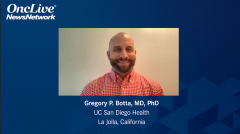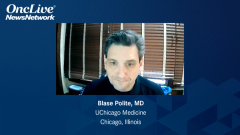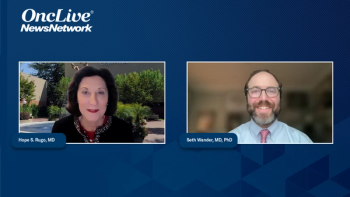
Updated Results of CIRCULATE-Japan in Colorectal Cancer
Implications of the GALAXY study in CIRCULATE-Japan, in terms of utilizing ctDNA to guide decisions for adjuvant chemotherapy in colorectal cancer.
Episodes in this series

Blase Polite, MD: I want to discuss the CIRCULATE-Japan program. It’s a somewhat complex design, so I’ll briefly describe the overall design of the trial and then focus on the GALAXY study. CIRCULATE-Japan is a 3-arm study of patients with stage II and III colon cancer or rectal cancer. They eventually will be included in the GALAXY study for patients with resectable M1 disease, so patients with liver or lung metastases. GALAXY is a prospective cohort study. It checks preoperative ctDNA [circulating tumor DNA] and postoperative ctDNA every 3 months for a 2-year period and looks at what happens to those patients. There’s no defined therapy in GALAXY. It’s simply looking at a cohort with usual care according to the physicians in Japan. They have a trial that they’re launching called the VEGA trial, which looks at patients who are ctDNA negative postoperatively and randomizes them to a control arm that will or will not get standard chemotherapy. In their trial, it will be capecitabine-oxaliplatin for 3 months vs the experimental arm, which is no chemotherapy. This is 1 of the more exciting studies and elements that we have. This will hopefully answer the question in a prospective fashion: can we deescalate therapy in ctDNA-negative patients?
This the third part of the trial. GALAXY is the cohort study, VEGA is the de-escalation trial, and the ALTAIR trial looks at patients who received adjuvant chemotherapy and are post-op ctDNA positive, or patients who were in the experimental arm of VEGA who didn’t get chemotherapy but turned positive at some point. They’re looking at giving 6 cycles of Lonsurf [trifluridine, tipiracil] therapy vs placebo, asking the question: if you’ve been appropriately treated with standard chemotherapy or weren’t treated but turned positive, can we use an alternative chemotherapy like Lonsurf and change the outcome in those patients? One can hypothesize that there’s very little we can do for ctDNA-positive patients. It’s not an unreasonable hypothesis that if you are ctDNA positive, your biology has declared itself, and no matter what we do your cancer will return. This is beginning to ask that question.
Focusing on the GALAXY study data in more detail and the data that we saw at ASCO GI [American Society of Clinical Oncology Gastrointestinal Cancers Symposium] in 2022, we’re looking at the positivity rate of patients preoperatively. Patients with stage I cancer had an 80% detection rate, and there were 96% detection rates in stages II and III. Postoperatively, patients who were stage II and III had about a 6% ctDNA positivity rate, compared with 25% to 30% in stage III and IV patients and stage IV–NED [no evidence of disease] patients who had their tumors resected.
The GALAXY study confirmed what we’ve seen from the [Thomas] Reinert trial data, from the extension, and the [Tenna] Hendriksen trial data: that ctDNA predicts relapse on average about 8 months before you see it on a CT scan. Whether you think that’s a good or bad thing depends on your perspective, but there’s no question that it’s a more sensitive and specific marker than anything else we have, and it’s certainly better than CTs in detecting disease. Whether that lead time is helpful, whether we’re just telling patients something that happens but with no strategy to treat them, from recent trials hopefully we’ll have a strategy to do something early before they develop macro metastatic disease.
Transcript edited for clarity.


































